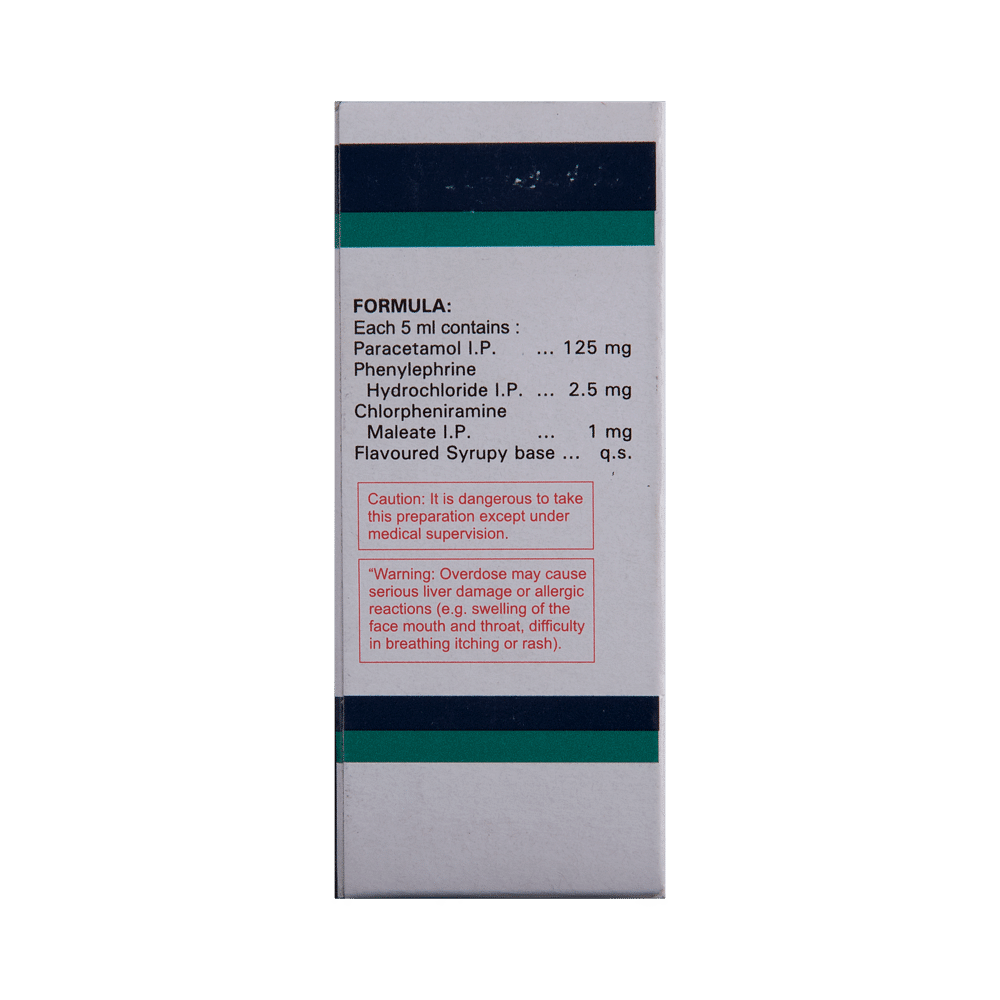
Efcold Syrup
Manufacturer
Suzikem Drugs Pvt Ltd
Salt Composition
Chlorpheniramine Maleate (1mg) + Paracetamol (25mg) + Phenylephrine (2.5mg)
Key Information
Short Description
Efcold Syrup is commonly prescribed in children to treat common cold symptoms like sore throat, runny nose, cough, sneezing, watery eyes, body ache, and fever.
Dosage Form
Syrup
Introduction
Efcold Syrup is a medication used primarily in children to alleviate symptoms associated with the common cold. These symptoms include sore throat, runny nose, cough, sneezing, watery eyes, body ache, and fever. The syrup combines three active ingredients: Chlorpheniramine, Paracetamol, and Phenylephrine. Chlorpheniramine is an antiallergic that helps relieve allergy symptoms such as runny nose and watery eyes. Paracetamol acts as an analgesic and antipyretic, reducing pain and fever by blocking certain chemical messengers in the brain. Phenylephrine is a nasal decongestant that narrows small blood vessels, providing relief from nasal congestion. While generally safe, it is important to monitor for any adverse reactions and consult a healthcare provider if any severe side effects occur.
Directions for Use
Administer the syrup as prescribed by your child's healthcare provider. Ensure the correct dosage is given and avoid combining with other cold and flu medications.
How it works
Efcold Syrup combines Chlorpheniramine, Paracetamol, and Phenylephrine to relieve common cold symptoms. Chlorpheniramine is an antiallergic that alleviates allergy symptoms. Paracetamol reduces pain and fever by blocking certain chemical messengers in the brain. Phenylephrine narrows small blood vessels to relieve nasal congestion.
Quick Tips
Efcold Syrup may make your child feel sleepy. Ensure your child takes extra care when taking part in physical activities. Never combine Efcold Syrup with other cold and flu medicines as that may lead to side effects. Stop Efcold Syrup and immediately report to the doctor if your child develops an itchy rash, facial swelling, or breathing difficulties. Clean and disinfect surfaces after sneezing and coughing to avoid allergy. Give your child plenty of fluids as it helps to thin and loosen the mucus in the lungs. Restrain your child from having dairy products, coffee, and foods that are spicy and fried as these can trigger coughing. Make your child gargle with warm saltwater. Ensure your child takes enough rest.
Related Medicines

Grilinctus Paediatric Syrup

Notril Plus Syrup

Medilocold Syrup

Korizyl Syrup

Flucret Syrup

Monocold Syrup

Sungesic Syrup

Triaminic Plus 1 mg/125 mg/2.5 mg Syrup

Wizaid Syrup

Recold Syrup
Frequently asked questions
What happens if I accidentally give my child too much Efcold Syrup?
If you give your child too much Efcold Syrup, it can lead to serious side effects such as seizures, rapid heart rate, depression, cognitive defects, and difficulty concentrating. To avoid this, always follow the recommended dosage instructions and use the calibrated cup provided with the medicine.
How should I store Efcold Syrup?
To keep Efcold Syrup effective and safe, store it at room temperature in a dry place away from direct heat and light. Also, ensure that all medications are kept out of reach and sight of children to prevent accidental intake.
Can my child take two medicines together for cough and fever?
No, do not give your child more than one cough or cold medicine at a time unless advised by the doctor. Using multiple medicines with similar ingredients can lead to an overdose and serious health implications.
Is it safe to give adult cough medicine to my child?
Never give your child medications intended for adults. Children require specifically formulated medicines, and using adult medications can cause unwanted side effects. Check the label carefully before giving any medicine to your child and consult the doctor if symptoms persist or worsen.
Can Efcold Syrup make my child sleepy?
Efcold Syrup may induce mild drowsiness in children, so be cautious not to use it as a sleep aid. Forced sleep can mask underlying sleep disorders like insomnia, and it's best to consult the child's doctor before administering this medicine.


